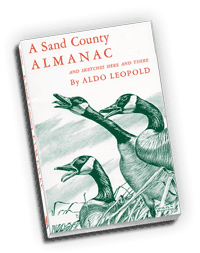Friday, July 22, 2005
Leopold on Community
Turning to a classic, Aldo Leopold's A Sand County Almanac: And Sketches Here and There, we find more thoughts on the notion of "community."

"All ethics so far evolved rest upon a single premise: that the individual is a member of a community of interdependent parts. His instincts prompt him to compete for his place in that community, but his ethics prompt him also to co-operate (perhaps in order that there may be a place to compete for).
The land ethic simply enlarges the boundaries of the community to include soils, waters, plants, and animals, or collectively: the land.
This sounds simple: do we not already sing our love for and obligation to the land of the free and the home of the brave? Yes, but just what and whom do we love? Certainly not the soil, which we are sending helter-skelter downriver. Certainly not the waters, which we assume have no function except to turn turbines, float barges, and carry off sewage. Certainly, not the plants, of which we exterminate whole communities without batting an eye. Certainly not the animals, of which we have already extirpated many of the largest and most beautiful species. A land ethic of course cannot prevent the alteration, management, and use of these 'resources,' but it does affirm their right to continued existence, and, at least in spots, their continued existence in a natural state.
In short, a land ethic changes the role of Homo sapiens from conqueror of the land community to a plain member and citizen of it. It implies respect for his fellow-members, and also respect for the community as such."
The point here is that how we define our "community" is central to ethics, to issues of what we consider right or wrong behavior and decisions. Those who reside within our community have certain rights and responsibilities those who are outside of it lack. Community members cannot be treated indiscriminately. Leopold makes it quite clear how including the land, waters, and animals in our community would alter our attitudes and behaviors toward them. Like for other members of our community (e.g., brothers, sisters, fathers, mothers, and others), we would show them respect.
Of course an important question is how we should therefore treat members of our community. How do we show them "respect?" What does it really mean to be a community member? How does community membership affect me, my attitudes, my assumptions, my options and opportunities?
If we are to address ecological problems, for example ones that begin with an attitude toward the land as "other" or "beyond my community," then we might suggest, following Leopold, that we should all (first?) learn to be better community members, to understand better what it really means to be a member of a community, and to practice living as such. Without truly understanding the notion of "community," simply defining aspects of the environment as being part of our community will not make much of a difference I suspect.
[By the way, I suspect the same might be said about "leadership," that the notion of community is central to its being effective. But that's for another post.]
I like this emphasis on community because it speaks to a similar emphasis of the Castle Rock programs. Living as a small cooperative group, sharing chores, meals, academic discussions, and outdoor trips really is what we do. We are, in fact, practicing what it means to live in a community. Quite regularly we all find ourselves examining our roles in relationship to the other community members around us. It's an excellent experience because, as I'm sure Leopold would agree, it prepares us for extending those relationships to the land. It helps make that extension more elaborate, more personal, and more effective.
Read more about Aldo Leopold at the Aldo Leopold Foundation's web site.


